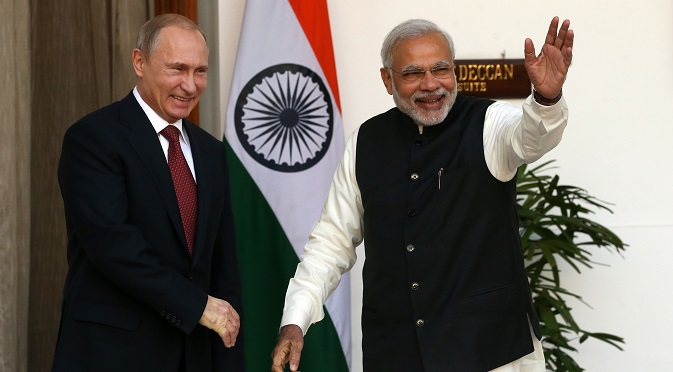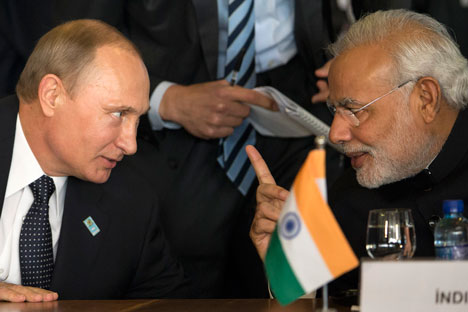Modi going to Russia for the “Triumph”

Vladimir Putin and Narendra Modi meet in New Delhi. Source: Konstantin Zavrazhin / RG
Sources in Indian government circles have informed Kommersant that Prime Minister Narendra Modi’s two-day visit to Moscow will start on Tuesday evening with an informal dinner with President Vladimir Putin, at the Russian President’s dacha. In New Delhi, they are referring to this meeting before the official talks as a “fireside tea,” designed to strengthen the close personal ties established shortly after Modi came to power in May 2014 at the head of his nationalist Bharatiya Janata Party government.
While Modi has met with Putin many times over the past 18 months, at various international platforms, including in Russia during the SCO and BRICS Summits in June at Ufa this year, this trip to Moscow is his first official state visit.
Indian garland
“This visit promises to be the most productive in the last decade. We are talking here about the work on deepening of the privileged strategic partnership between the two countries in the most sensitive fields – in particular, the nuclear sector and the military-technical sphere. The manifestations of ‘personal chemistry’ between these two leaders, as well as preparations for the signing of an agreement, should once and for all refute the recently circulating thesis – that India has allegedly been moving further away from Russia, and reorienting itself towards the United States,” Alexander Kadakin, the Russian Ambassador to India, told Kommersant, while explaining the significance of the upcoming meeting.
One of the main sensations is expected to be Narendra Modi’s announcement of India’s readiness to allocate land in the south Indian state of Andhra Pradesh for construction of a new, Russian-designed nuclear power plant, comprising six power units.
Another outcome of the summit should be the signing of a technical agreement on construction of the 5th and 6th power units at Kudankulam NPP. This will eventually increase the number of Russian nuclear reactors operating in India to 12. In addition, of special importance to Delhi, is the possibility of organizing joint production with Russia of fuel for its nuclear power plants.
In the air, at sea, and on the land
Breakthrough agreements are also expected in another traditionally priority area of bilateral cooperation between the two countries; the military-technical sphere. The total package of contracts to be signed is estimated at over $7 billion. On the eve of Prime Minister Modi’s trip to Moscow, the Defence Acquisitions Committee of the Indian government has approved the allocation of funds for the purchase of Russian S-400 ‘Triumph’ air-defence missile systems (ADMS). India may buy at least five batteries of the S-400s, becoming the second foreign customer of these systems after China.
However, Kommersant’s source in one of the enterprises of the Russian military-industrial sector said that negotiations on the S-400s will not be easy – the Russian asking price for the five batteries of S-400s, of approximately $2.5 billion, does not suit India. “Ultimately, everything will depend on the negotiations between the two heads of state,” Kommersant’s source noted.
They will also discuss with India a purchase agreement for two diesel-electric submarines of the Project 636 – the ‘Varshavyanka’ class, three frigates of Project 11356, and 48 Mi-17V5 military transport helicopters. “Negotiations are already underway on the purchase of 150 BMP-2K armoured vehicles, as well as the modernization of Indian Air Force’s fleet of IL-78s and IL-76s,” Kommersant learned from it source in the military-technical cooperation sphere. “We are also waiting for the decision on leasing of a second Project 971 nuclear submarine.”
Another widely discussed topic was the preparations for signing of an intergovernmental agreement on joint production in India of 200 multi-role Ka-226T helicopters.
Although the foundation of Russian-Indian cooperation continues to be in the nuclear and defence industries, the two countries are determined to diversify their mutual trade and economic ties. Unlike in the nuclear and defence sectors, the overall picture of trade and economic ties between the two countries has not been very impressive, and thus not much optimism exists here. In 2014, bilateral trade reached a rather modest $9.51 billion, and for the first six months of this year, total trade amounted to only $3.15 billion.
To resolve the serious trade imbalance, and increase the volume of trade and economic cooperation, Prime Minister Modi is taking with him to Moscow a large delegation of top executives of leading Indian companies. The cream of Indian business circles are travelling to the Russian capital; among them, Mukesh Ambani (Reliance Industries), Anil Ambani (Reliance Group), Cyrus Mistry (Tata), Baba Kalyani (Bharat Forge) and Shashi Ruia (Essar).
All rights reserved by Rossiyskaya Gazeta.
Subscribe
to our newsletter!
Get the week's best stories straight to your inbox
